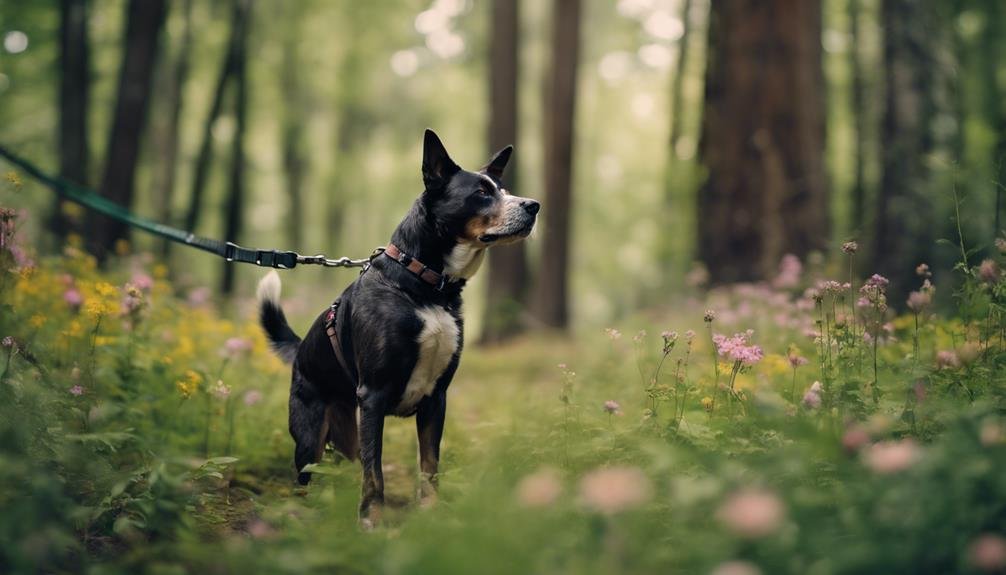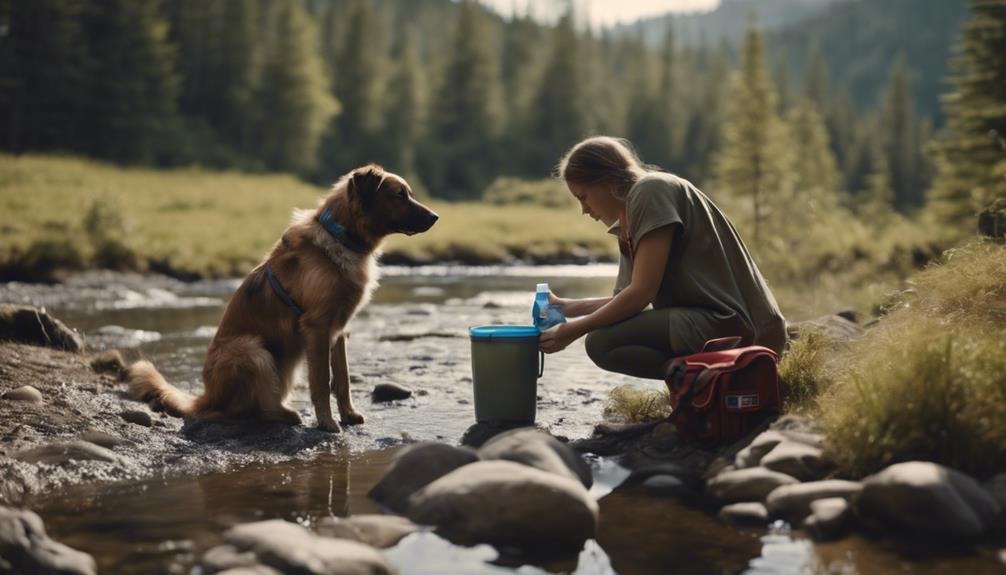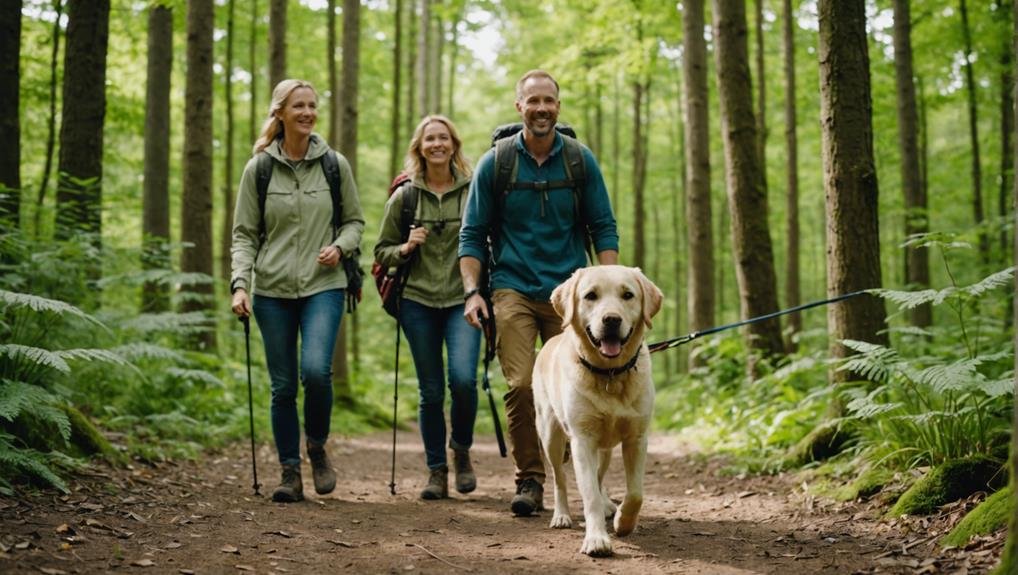As you plan your next outdoor adventure, consider bringing your dog-friendly dog along for hiking, which is as invigorating for them as it is for you. Selecting a trail that matches your dog’s stamina and paw durability is important. You’ll need to think about not just the length and difficulty of the hike but also whether the path provides enough shade and access to water to keep your dog comfortable.
Equipping your dog with the right gear, such as a harness and protective booties, can make the journey safer and more enjoyable for both of you. But how do you guarantee your furry friend stays happy and healthy from start to finish? Let’s explore some essentials that might surprise you.
Key Takeaways
- Choose trails that are designated as dog-friendly to ensure safety and compliance with regulations.
- Start with shorter, flatter trails if your dog is new to hiking to build endurance gradually.
- Equip your dog with a sturdy leash, protective booties, and a collapsible water bowl for hydration.
- Monitor your dog for signs of fatigue, such as excessive panting or reluctance to continue, and adjust your hike accordingly.
- After hiking, check your dog’s paws for injuries, provide fresh water, and brush their coat to remove debris.
Choosing the Right Trail
When planning a hike with your furry friend, it’s important to choose a trail that suits their fitness level and ensures their safety and enjoyment. Before you set out, make sure the trail is dog-friendly. Some trails have specific rules for dogs, including leash requirements or restricted areas, so checking these details in advance is essential.
Consider the trail’s length and difficulty. Start with shorter, flatter trails if your dog is new to hiking or doesn’t get much daily exercise. Gradually work up to longer or more challenging hikes as your dog builds stamina. This keeps the experience positive and prevents overexertion.
Look for trails that offer plenty of shade and water sources. These features are important for keeping your dog cool and hydrated, especially on warm days. Avoid trails with heavy wildlife activity or hazardous plants, as these can threaten your dog’s safety.
Essential Gear for Dogs
Packaging the right gear is vital to guarantee your dog’s comfort and safety on your hiking adventure. When you’re exploring dog-friendly hiking trails, the right equipment enhances safety and ensures a joyful and stress-free experience for both of you. Here’s what you’ll need:
- Sturdy Leash: This keeps your dog under control, avoiding unexpected encounters or dangers.
- Hiking Backpacks: Allow your furry friend to help carry essentials like water and lightweight snacks, balancing the load and giving them a sense of purpose.
- Protective Dog Booties: These boots protect dogs’ paws from sharp rocks, thorny underbrush, and scorching hot trails, ensuring they can walk comfortably beside you.
- Collapsible Water Bowl: Essential for easy storage and maintaining hydration, making water breaks quick and effortless.
Choosing these essentials contributes significantly to the overall safety and enjoyment of your outing. The hiking backpacks distribute weight and help train your dog to be a responsible trail partner. Meanwhile, hydration remains a top priority, and a collapsible water bowl ensures your dog stays hydrated without the extra bulk. With this essential gear, you’re all set for a memorable adventure that keeps your dog’s well-being at the forefront.
Trail Etiquette With Pets

During your hikes, keeping your dog on a leash is vital for safety and wildlife preservation. This aligns with leash regulations and prevents any unexpected encounters with wildlife, ensuring that the natural inhabitants and your furry friend are safe.
When hiking with dogs, it’s important to be aware of pet-friendly trails and adhere to specific pet access rules that may vary from one area to another. Trail etiquette also extends to how you handle pet waste disposal. Always carry bags to clean up after your dog and dispose of the waste properly.
This is a key part of maintaining trail cleanliness, which benefits everyone who shares this space. You’d also want to show hiker courtesy by yielding the right of way to those without pets. This simple gesture helps prevent overcrowding and allows everyone to enjoy their hike without discomfort.
Recognizing Dog Fatigue Signs
As you hike with your dog, it’s important to recognize signs of fatigue, such as excessive panting or slowing down, to safeguard their well-being. Monitoring these signs is vital to ensure your furry friend enjoys the hike just as much as you do. Watch for any changes in their behavior that might indicate they’re not just tired but potentially overstressed or overheated. Here are key indicators of dog fatigue to watch for:
- Excessive Panting: Unlike typical breathing, if your dog is panting heavily, it might be a sign that it needs a break.
- Slowing Down or Lagging: If your dog, usually up ahead or beside you, starts falling behind, it’s time to slow your pace or stop for a rest.
- Excessive Drooling or Seeking Shade are signs that your dog might be overheating. Find a cool spot and let it rest.
- Reluctance to Continue or Body Language Cues: Watch for any hesitation to move forward or changes like tail tucking and ears pinning back, which indicate discomfort or fear.
Consider your dog’s breed, age, and fitness level, as these can influence their endurance. Adjusting your hike to fit their needs guarantees their safety and makes the outing enjoyable for both of you.
Post-Hike Dog Care Tips

After recognizing your dog’s fatigue signs during the hike, it’s equally important to focus on their post-hike care to maintain their health and comfort. First, offer your dog plenty of fresh water to promote hydration and help prevent heat exhaustion, especially after long or strenuous trails.
Hydration is key to helping them cool down and replenish any lost fluids. Next, carefully check your dog’s paws for any cuts, abrasions, or foreign objects like thorns or burrs. These can cause discomfort or lead to infections if not addressed promptly.
Gently remove any debris, and if you notice significant injuries, consider a vet consultation to ensure proper care is provided. It’s also important to brush your dog’s coat post-hike. This not only helps to remove burrs, ticks, and other debris they might’ve picked up but also gives you a chance to inspect their skin for any irregularities or hidden pests.
Monitor your pet for signs of soreness or limping, which indicate muscle strain or injury. If these symptoms persist, consult a vet.
Conclusion
As you wrap up your hiking adventure, remember the joy of exploring nature with your furry friend. Ensure you’ve chosen a trail that matches their abilities, equipped them with the right gear, and followed proper trail etiquette. Always be vigilant for signs of fatigue and take necessary post-hike care to keep them happy and healthy. Here’s to many more trails conquered and memories made together! Happy hiking!
Explore More Articles:
Best Place to Stay in Yellowstone for Families and Couples
Congaree National Park: Discover the Hidden Gems of Carolina
Discover the Best Mountain Getaway in Western NC for Relaxation

